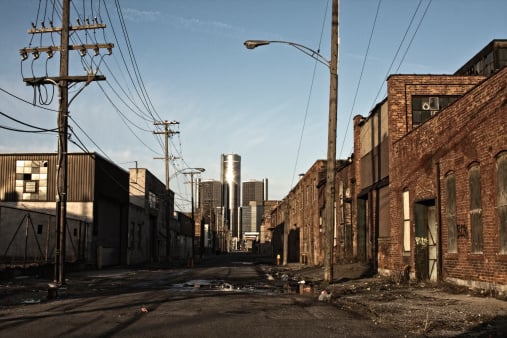Investing
As Jefferson County Exits Chapter 9, Detroit Prepares for Bankruptcy
Published:
Last Updated:
Jefferson County, Ala., which entered Chapter 9 over a year ago, may have set a deal to exit via an agreement with J.P. Morgan Chase & Co. (NYSE: JPM) and other lenders. The settlement comes just months before Detroit is likely to enter bankruptcy. The difference is that the decline of what was once the nation’s fifth largest city cannot be reversed, which makes the case much more dire, and perhaps one that cannot be solved under any circumstances. Source: Thinkstock
Source: Thinkstock
According to The Birmingham News:
[T]he agreement means a reduction in the county’s sewer debt to $1.835 billion from $about 3.078 billion. JPMorgan will give up about $842 million of the $1.2 billion in sewer debt it holds. … In all, JPMorgan will give up about 88 percent of its total claims …
The number seems large, until it is compared to Detroit’s. The Wall Street Journal reports on plans for Detroit:
Detroit’s emergency manager plans to call unions and creditors to a meeting in mid-June amid signs he is laying the groundwork to take the city into bankruptcy within a matter of months.
Kevyn Orr, appointed by Michigan Gov. Rick Snyder in March to take control of the long-struggling city, plans to use the meeting to present a detailed restructuring plan for Detroit’s liabilities, which he says total about $17 billion.
There are dozens of ways to compare Jefferson County and Detroit. For one, the population of the county’s largest city — Birmingham — has declined over the past 20 years, as has Detroit’s. But Detroit’s obligations stretch across a huge swath of its debt, and just an important will effect the size of the city’s workforce and its legal promises to them.
The tactics Detroit may use include selling the contents of its art museum and perhaps some of the animals in its zoo. These make for great headlines, but do not get beneath the surface of the city’s problem.
Orr might assume, fairly, that bankruptcy will allow the chopping of pension plans for city workers and a massive reduction of workforce. It also may allow brutal negotiations with creditors. But, in the end, the exodus of Detroit’s citizens and companies will mean a tax base that will continue to drop closer to zero each year. Even though this caricature is an exaggeration, no other city as large as Detroit can be said to face problems even close to the ones it faces.
Detroit’s situation has been described as very different from Jefferson County’s. In reality, they are worlds apart.
Ever wanted an extra set of eyes on an investment you’re considering? Now you can speak with up to 3 financial experts in your area for FREE. By simply
clicking here you can begin to match with financial professionals who can help guide you through the financial decisions you’re making. And the best part? The first conversation with them is free.
Click here to match with up to 3 financial pros who would be excited to help you make financial decisions.
Thank you for reading! Have some feedback for us?
Contact the 24/7 Wall St. editorial team.